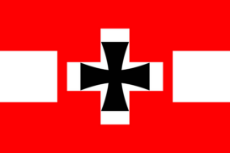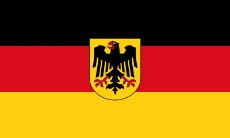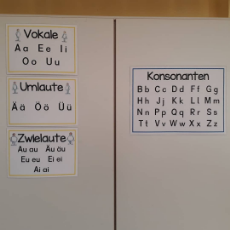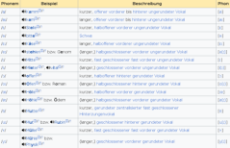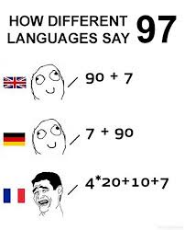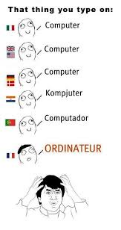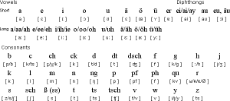German language thread
----------------------
i wanna make this thread for myself because i recently decided to learn german.
if you guys wanna add to it or use it as well , please feel free
i had some other files as pdf , but i cannot send it here so i will take picture sent it here
--
german picture dictionary:
https://ia600505.us.archive.org/2/items/GermanPictureDictionary/German%20Picture%20Dictionary.pdf
german compelete grammar:
https://archive.org/download/cu31924031287216/cu31924031287216.pdf
/ub/ - Überhengst
Becoming better
14 replies | 11 files | 6 UUIDs | Page 2
>>391215
okay so we have that already
okay i will delete this thread then
okay so we have that already
okay i will delete this thread then
>>391216
it gives 500 error
it gives 500 error
>>391218
The mod will move it, perhaps.
The mod will move it, perhaps.
>>391219
okay thanks anon
okay thanks anon
>>8670
okay thanks mods for moving this thread
-----
I usually start with learning pronouns then sentence making
pic taken from:
https://easy-deutsch.com/
the site has free grammar courses and lessons
okay thanks mods for moving this thread
-----
I usually start with learning pronouns then sentence making
pic taken from:
https://easy-deutsch.com/
the site has free grammar courses and lessons
>>8676
You can also start by learning how to pronounce vowels, and consonants. I hear that many teachers omit that, but it is a vital base to build language skills upon. I'm sure you can find good vids on the old jewtube. I found that just repeating the words throughout the day really works and may even keep you motivated.
Pics related may not be so useful but using a video guide you don't need to know any IPA standard.
The next step may be... personal pronouns. Though I'm not a teacher, maybe there is a better order.
One of the advantages of german is that it is a standardised language. It was simple to do so, as it's not spoken in a large area, when compared to english.
You can also start by learning how to pronounce vowels, and consonants. I hear that many teachers omit that, but it is a vital base to build language skills upon. I'm sure you can find good vids on the old jewtube. I found that just repeating the words throughout the day really works and may even keep you motivated.
Pics related may not be so useful but using a video guide you don't need to know any IPA standard.
The next step may be... personal pronouns. Though I'm not a teacher, maybe there is a better order.
One of the advantages of german is that it is a standardised language. It was simple to do so, as it's not spoken in a large area, when compared to english.
>>8677
>It was simple to do so
German is anything but simple.
Pic not related but in English means: "German universities have 160 professors for Gender Studies and only 6 for applied nuclear physics"
>It was simple to do so
German is anything but simple.
Pic not related but in English means: "German universities have 160 professors for Gender Studies and only 6 for applied nuclear physics"
>>8677
thank you sir , i appreciate it
i should watch some german conversation videos as well to get the idea of the pronunciation and the accent
>>8678
>german is hard
i know but believe me when i say : it is 100% better than french
german has so many grammar rules and some few irregulars
and it is a very well structured language
--
french is just irregulars gangbanged together to create a language and the grammars are so horrible
i am a english literacy major student as a ESL and i had to chose a second language -(and i do agree english is much simpler language)-
they did not had employee for spanish nor german and only one professor for french so i had to choose french
my finals gonna start about a week and my first test is french and i did not studied shit about it
i fucking hate france , most french people i met online were a bunch of assholes and i do not enjoy learning about french at all
---------
debate about which language is the hardest , number one always goes to chinese
i think from the day that you born till the day that you die , you are still gonna learn new mandarin symbols
thank you sir , i appreciate it
i should watch some german conversation videos as well to get the idea of the pronunciation and the accent
>>8678
>german is hard
i know but believe me when i say : it is 100% better than french
german has so many grammar rules and some few irregulars
and it is a very well structured language
--
french is just irregulars gangbanged together to create a language and the grammars are so horrible
i am a english literacy major student as a ESL and i had to chose a second language -(and i do agree english is much simpler language)-
they did not had employee for spanish nor german and only one professor for french so i had to choose french
my finals gonna start about a week and my first test is french and i did not studied shit about it
i fucking hate france , most french people i met online were a bunch of assholes and i do not enjoy learning about french at all
---------
debate about which language is the hardest , number one always goes to chinese
i think from the day that you born till the day that you die , you are still gonna learn new mandarin symbols
>>8681
Along the lines of vowels and pronuciation, German is one of the kinder languages (unlike english) were you pronouce the vowels the same way always, no matter the spelling or phrasing. Jà and Hàmmertzeit (the à) are both said the same.
A, E, I, O, and U are pronounced as Ah (as in autumn), Eh (as in ayyyy lmao), Ih ("if" I feel like it), Oh (Oh MY), and Uh (oooh!). If you're familiar, German is oddly identical to Japanese in that regard.
There are no 'silent' consonants OR vowels, EVERYTHING gets 'mention'. To the earlier example: Hammerzeit: Haa-mer-zite.
That wasn't the best example, as it involves multiple vowelsin conjunction,... but it DOES transition nicely (meaning, without hrt) into the next part which is all about the phrasing of multiple vowels. Ei is pronounced like "I" as in "I have a boner". Another fun one is Eu as in Freud (pronounced oi, as in "oi, you got a loicence for that meme).
Along the lines of vowels and pronuciation, German is one of the kinder languages (unlike english) were you pronouce the vowels the same way always, no matter the spelling or phrasing. Jà and Hàmmertzeit (the à) are both said the same.
A, E, I, O, and U are pronounced as Ah (as in autumn), Eh (as in ayyyy lmao), Ih ("if" I feel like it), Oh (Oh MY), and Uh (oooh!). If you're familiar, German is oddly identical to Japanese in that regard.
There are no 'silent' consonants OR vowels, EVERYTHING gets 'mention'. To the earlier example: Hammerzeit: Haa-mer-zite.
That wasn't the best example, as it involves multiple vowelsin conjunction,... but it DOES transition nicely (meaning, without hrt) into the next part which is all about the phrasing of multiple vowels. Ei is pronounced like "I" as in "I have a boner". Another fun one is Eu as in Freud (pronounced oi, as in "oi, you got a loicence for that meme).
>>8682
i get what you mean
that is a good thing about a language learner to know if the word they are seeing or hearing are the same way that they can write it
english also has so many irregular pronunciations in constants as well such as
school - chalk /chuk/ /eskool/
--
i think one thing that makes german hard as a language is the long words or combinations of adjectives and nouns together , like suffix and prefixes
i get what you mean
that is a good thing about a language learner to know if the word they are seeing or hearing are the same way that they can write it
english also has so many irregular pronunciations in constants as well such as
school - chalk /chuk/ /eskool/
--
i think one thing that makes german hard as a language is the long words or combinations of adjectives and nouns together , like suffix and prefixes
German Writing system
German is written using the Latin alphabet. In addition to the 26 standard letters, German has three vowels with Umlaut, namely ä, ö and ü, as well as a special symbol for "ss", which is only used after long vowels or diphthongs, the Eszett (ß).
<pic related
-----------------
Notes:
b = [ p ] at the end of a syllable or before s or t, [ b ] before a vowel
ch = [ χ ] after a, o or u, [ k ] when followed by a, o or u at the beginning of a word, [ ç ] elsewhere
d = [ t ] at end of a syllable or before s or t, [ d ] before a vowel
e = [ ə ] in unaccented syllables
g = [ k ] at end of a syllable or before s or t, [ g ] before a vowel, [ ʒ ] in some loanwords, ig = [ iç ]
h when appearing after a vowel, makes the vowel long, [ h ] elsewhere
j = [ ʒ ] in loan words, [ j ] elsewhere
r = [ɐ], e.g. fort [fɔɐt ] or silent, e.g. Haar [haː], between a vowel and a consonant, [ʁ] or [ʀ] elsewhere
s = [ z ] between vowels, [ ʃ ] before t or p at the beginning of words and [ s ] elsewhere
v = [ v ] in loan words
y = [ y ] in words derived from Greek, [ i ] or [ j ] elsewhere
dsch, ph, qu and y only appear in loan words
German is written using the Latin alphabet. In addition to the 26 standard letters, German has three vowels with Umlaut, namely ä, ö and ü, as well as a special symbol for "ss", which is only used after long vowels or diphthongs, the Eszett (ß).
<pic related
-----------------
Notes:
b = [ p ] at the end of a syllable or before s or t, [ b ] before a vowel
ch = [ χ ] after a, o or u, [ k ] when followed by a, o or u at the beginning of a word, [ ç ] elsewhere
d = [ t ] at end of a syllable or before s or t, [ d ] before a vowel
e = [ ə ] in unaccented syllables
g = [ k ] at end of a syllable or before s or t, [ g ] before a vowel, [ ʒ ] in some loanwords, ig = [ iç ]
h when appearing after a vowel, makes the vowel long, [ h ] elsewhere
j = [ ʒ ] in loan words, [ j ] elsewhere
r = [ɐ], e.g. fort [fɔɐt ] or silent, e.g. Haar [haː], between a vowel and a consonant, [ʁ] or [ʀ] elsewhere
s = [ z ] between vowels, [ ʃ ] before t or p at the beginning of words and [ s ] elsewhere
v = [ v ] in loan words
y = [ y ] in words derived from Greek, [ i ] or [ j ] elsewhere
dsch, ph, qu and y only appear in loan words
A little bit of introduction to german grammar
German is an inflected language. In contrast to Latin, the inflection sometimes affects not only the word ending but also its stem, making declension and conjugation slightly more difficult.
German nouns inflect into:
one of three declension classes;
one of three genders: masculine, feminine, or neuter. Word endings indicate some grammatical genders; others are arbitrary and must be memorized;
two numbers: singular and plural;
four cases: nominative, genitive, dative, and accusative case.
In the German orthography all nouns and most words that take the syntactical function of nouns are capitalized.
Verb inflection:
one of two conjugation classes, weak and strong. There are about 200 irregular verbs;
three persons;
two numbers: singular and plural;
three moods: Indicative, Conditional, Imperative;
two voices: active and passive; the passive being composed and dividable into static and dynamic;
2 non-composed tenses (Present, Preterite) and 4 composed tenses (Perfect, Plusquamperfect, Future I, Future II);
no distinction between aspects;
There are also a lot of ways to expand the meaning of a base verb through several prefixes.
The word order is much more flexible than in English. The word order can be changed for subtle changes of a sentence's meaning.
--
this is For now
i will send more about german grammar in a more structured way later
Starting from nouns to verbs
German is an inflected language. In contrast to Latin, the inflection sometimes affects not only the word ending but also its stem, making declension and conjugation slightly more difficult.
German nouns inflect into:
one of three declension classes;
one of three genders: masculine, feminine, or neuter. Word endings indicate some grammatical genders; others are arbitrary and must be memorized;
two numbers: singular and plural;
four cases: nominative, genitive, dative, and accusative case.
In the German orthography all nouns and most words that take the syntactical function of nouns are capitalized.
Verb inflection:
one of two conjugation classes, weak and strong. There are about 200 irregular verbs;
three persons;
two numbers: singular and plural;
three moods: Indicative, Conditional, Imperative;
two voices: active and passive; the passive being composed and dividable into static and dynamic;
2 non-composed tenses (Present, Preterite) and 4 composed tenses (Perfect, Plusquamperfect, Future I, Future II);
no distinction between aspects;
There are also a lot of ways to expand the meaning of a base verb through several prefixes.
The word order is much more flexible than in English. The word order can be changed for subtle changes of a sentence's meaning.
--
this is For now
i will send more about german grammar in a more structured way later
Starting from nouns to verbs
